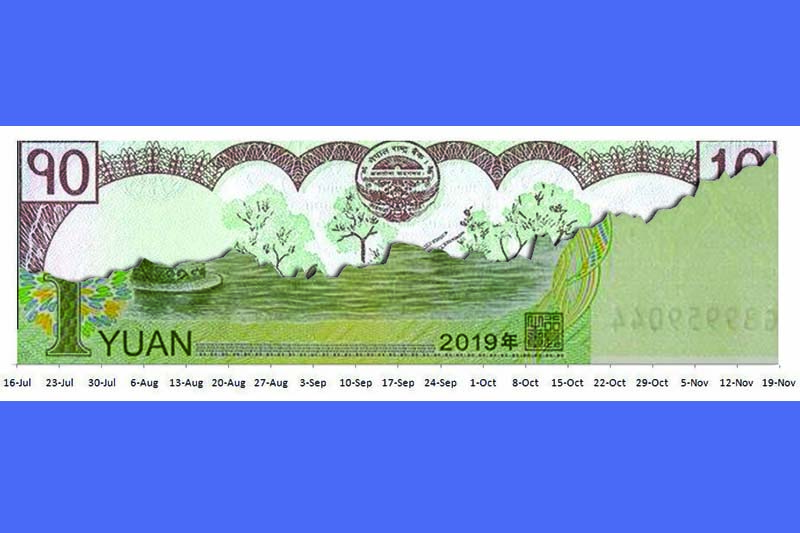Rising value of yuan likely to raise import cost
KATHMANDU, NOVEMBER 19
Despite the impact of the COVID-19 pandemic, the Chinese economy is growing of late making its currency stronger.
Even during the pandemic, the value of the Chinese currency, yuan, that is also called the renminbi, has been growing each day. In the meantime, stakeholders have stated that the increasing value of the Chinese currency might have an impact on the country’s import making it costlier.
Gunakar Bhatta, spokesperson for Nepal Rastra Bank (NRB), mentioned that even though the country’s trade relation with China is not so intense, imports from China have been gradually rising in recent years. “Recently, China’s trade has been increasing and so its economy. As a result its currency is getting stronger whereas the US dollar has remained constant for a long time,” he said. “This might have an effect on our imports as the country’s import of goods from China has been growing in recent years.”
As per Bhatta, during the pandemic the Chinese economy rose by two per cent.
He further stated that though import from China will become expensive, the positive side is that it will be beneficial for us if we can export our products to the northern neighbour.
“However, this is just a wishful prediction as currently our imports are higher than exports,” Bhatta added. “As the international market has also predicted that the yuan will continue to strengthen the growing value of Chinese currency is surely going to make goods expensive in the country,” he said.
Meanwhile, it is a good aspect for Nepal’s tourism sector, he opined.
“Visitors from China constitute the second largest group that visits Nepal, so if this number continues growing it will benefit our tourism industry,” Bhatta added.
Currently, Nepali traders are allowed to make transactions in both yuan and the US dollar. However, the US dollar is more widely used than yuan.
The exchange rate of yuan today was Rs 18.17. As reported by Reuters, on Wednesday, yuan held near 29-month high as the dollar stays under pressure. On Wednesday, the selling rate of yuan in Nepal was Rs 18.23. Looking at the trend, the yuan has been fluctuating since mid-July. On July 16, the selling rate of yuan was Rs 17.25 and it reached Rs 18 on November 6. On November 7 and November 8 the exchange rate stood at Rs 17.98.
On November 13, it reached Rs 18.9 and since then it has kept growing for a week.
Meanwhile, former governor of Nepal Rastra Bank Deependra Bahadur Chhetri, said that the increasing value of yuan might not have an immediate effect on the Nepali market but in the future it will surely lead to inflation in the country.
“China is the second largest economy of the world and its rapid economic recovery despite the impact of the COVID-19 has startled the global market,” he said, adding, “Its export has also increased and Nepal being a country that imports goods from China, inflation rate in the country is likely to go up.” Chhetri further highlighted that most of the essential goods like clothes, among others are being largely imported from China and such imports are gradually rising.
Thus, imports will be expensive for traders and goods will become expensive for consumers.
According to the Department of Customs, China is the second largest trading partner of Nepal constituting 14.15 per cent of Nepal’s total trade with third countries in the previous fiscal year. Nepal’s import trade with China accounted for 15.20 per cent of its total import trade.






